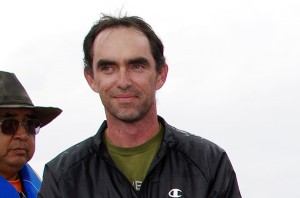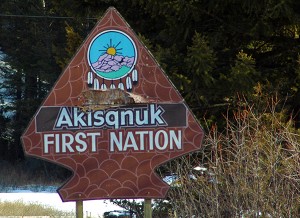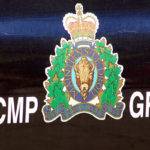Home »

?Akisq’nuk asks to join RDEK
By Ian Cobb/e-KNOW
The ?Akisq’nuk First Nation would like to take a seat at the Regional District of East Kootenay (RDEK) board of directors’ table.
In a March 18 letter to RDEK Board Chair Rob Gay (Electoral Area C Director), ?Akisq’nuk Chief Lorne Shovar formally requests his first nation and other First Nations within the RDEK “each be given a full chair – with all associated responsibilities and duties – at the board table.
“The ?Akisq’nuk First Nation, like other first nations in the area, is a democratic community with a council elected to make the best decisions possible for its members. In this way, first nations are much like the local municipal governments that you and your fellow board members represent,” Shovar outlines.

“The ?Akisq’nuk First Nation urges you and your fellow directors to be among the leaders in the province and to bring democratically-elected representatives of the constituents on reserve, who are voters within the (RDEK), to the board table. We firmly believe that this is the only way that many of the matters affecting Aboriginal people, and all citizens, on a regional level may be properly addressed and improved.”
RDEK board members discussed the request April 10, with several noting approval of allowing First Nation seats at the regional table but the Local Government Act only allows First Nation participation at a regional district board table if a treaty has been signed with the province.
The Ktunaxa First Nation, of which the ?Akisq’nuk are a part, is currently well into treaty negotiations with the province but nothing has been signed yet.
 “While the Local Government Act provides for membership of treaty first nations on regional district boards, there is no allowance for first nations that have not completed the treaty process,” reported RDEK chief administrative officer Lee-Ann Crane. “A few regional districts have provided first nation representatives limited membership on their boards. In these cases, they are able to attend and participate in meetings but are not able to vote. A regional district board can allow for first nation representatives to be included on committees with full voting rights, however they would still not be able to vote at the board table where issues are brought forward for final decision. If a committee is delegated authority by the board for certain decisions, the first nation representative could have a vote on those items.”
“While the Local Government Act provides for membership of treaty first nations on regional district boards, there is no allowance for first nations that have not completed the treaty process,” reported RDEK chief administrative officer Lee-Ann Crane. “A few regional districts have provided first nation representatives limited membership on their boards. In these cases, they are able to attend and participate in meetings but are not able to vote. A regional district board can allow for first nation representatives to be included on committees with full voting rights, however they would still not be able to vote at the board table where issues are brought forward for final decision. If a committee is delegated authority by the board for certain decisions, the first nation representative could have a vote on those items.”
Crane informed the board that if it is interested in working with regional first nations moving forward the first step “would be to meet with interested chiefs to discuss their interest and explore options that would allow them to provide meaningful input.”
Noting “there won’t be seats on the board until treaty is done,” Gay asked the board for permission to allow him and board vice-chair Wendy Booth (Electoral Area F Director) to hold discussions with Shovar and his council.
Electoral Area G Director Gerry Wilkie said he supports entering into discussions with ?Akisq’nuk First Nation, located between Fairmont Hot Springs and Windermere. “Chief Shovar reached out to us” and that should be respected, he said. “It goes without saying that over time we will have representation” from first nations.
In the meantime, Booth suggested, there is an opening on her Advisory Planning Council and she has issued an invitation to ?Akisq’nuk First Nation to come aboard. She hasn’t received a response yet, she added.
Electoral Area A Director Mike Sosnowski made a motion for Gay and Booth to hold follow up discussions with Chief Shovar and to explain the board’s current position. The motion was unanimously approved.







